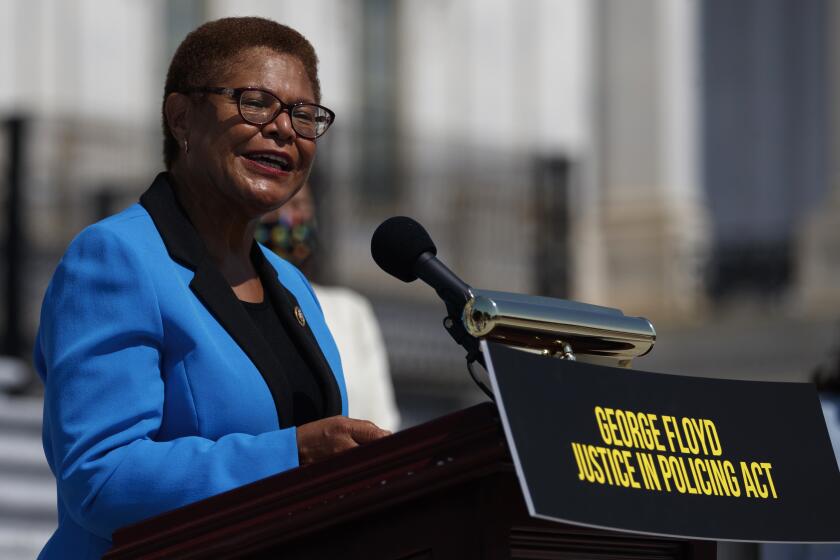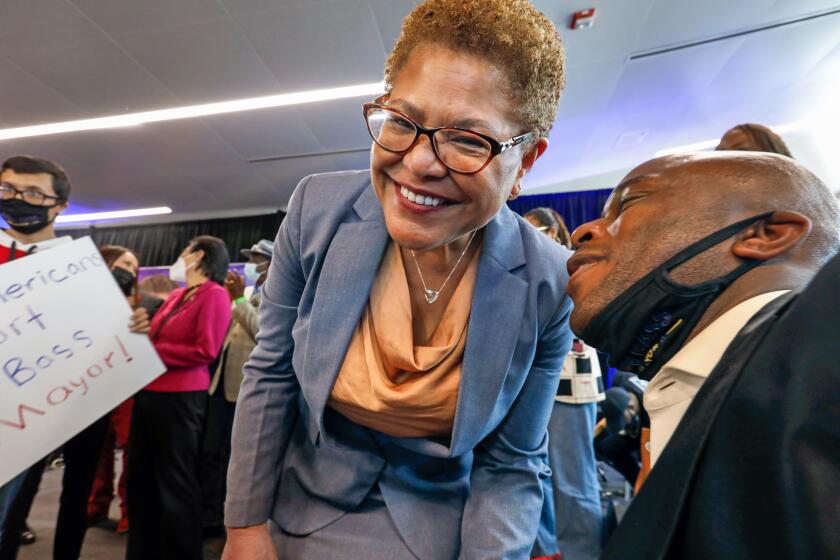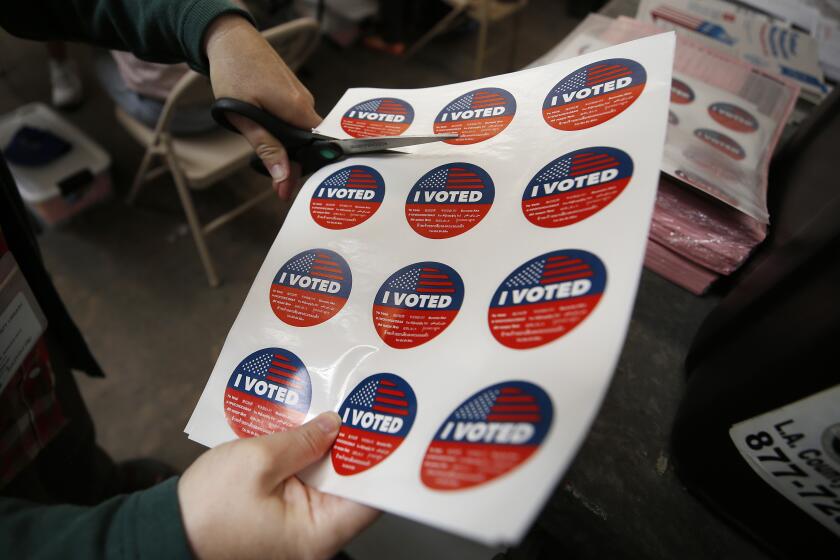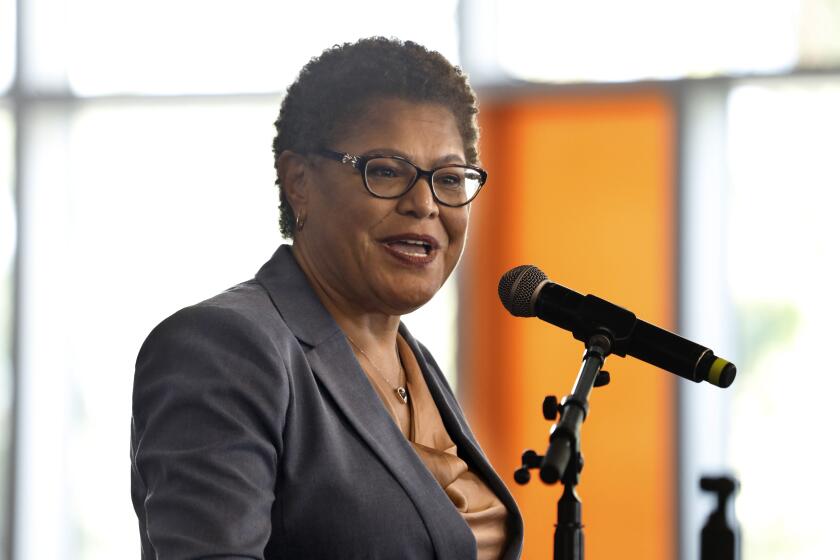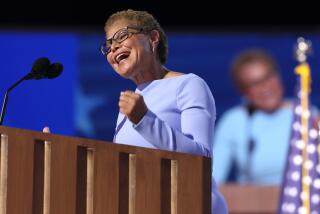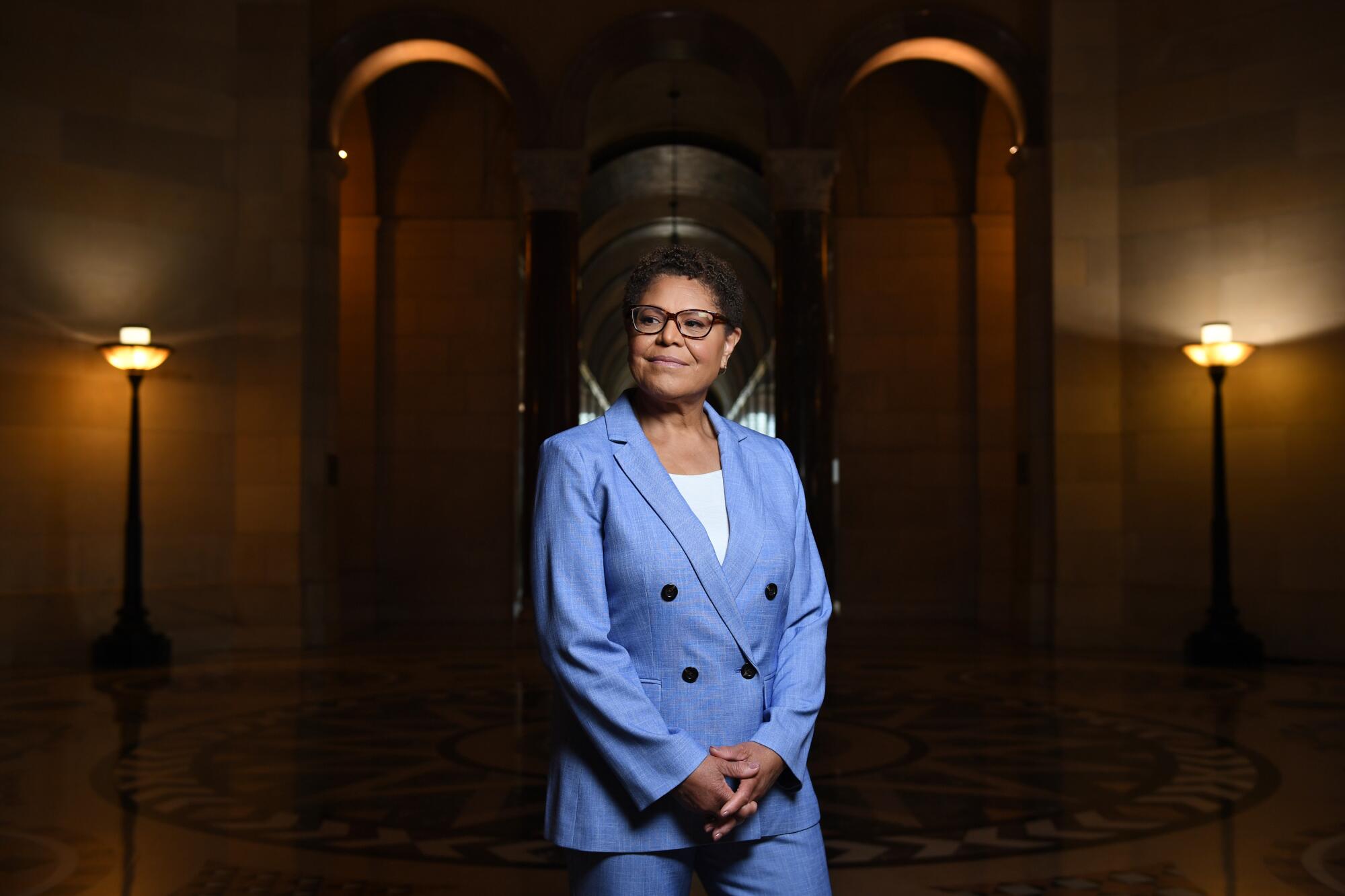
- Share via
Many nights in the early 1990s, Elmer Roldan got a ride home from a woman in a beat-up green minivan full of kids.
She listened to them talk about their problems. For Roldan, South Los Angeles was a tough place at the time, and her counsel was critical in keeping him from getting lost at home or on its streets.
His family had emigrated from Guatemala in the late 1980s, and the pull of crack cocaine and street gangs on one side — and police abuse on the other — were all conspiring against a teenager trying to fit in.
Fortunately, he found the nonprofit Community Coalition in a storefront on South Vermont Avenue and its leader and minivan driver, Karen Bass.
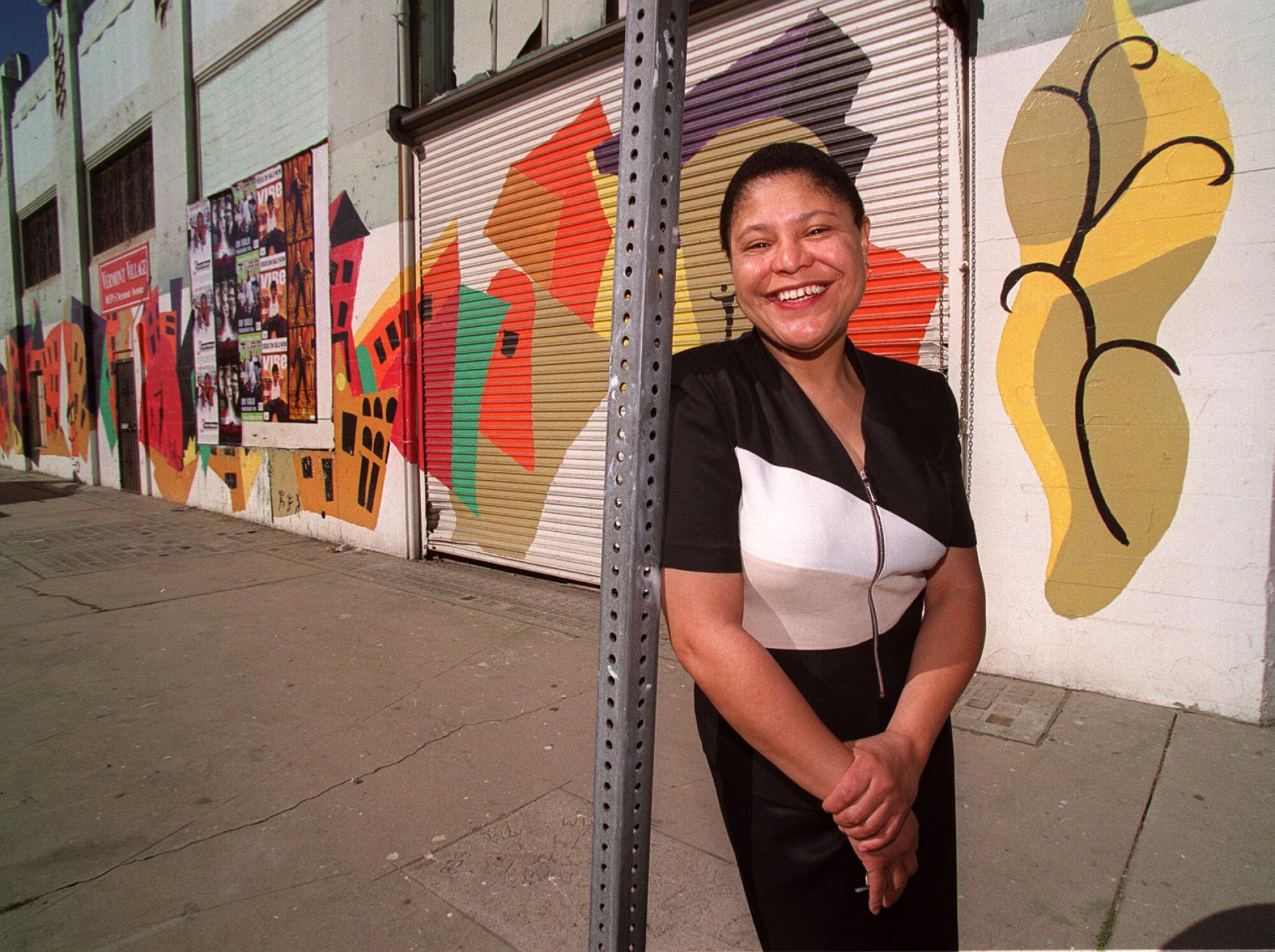
The students enjoyed free dinner — often Taco Bell — structure, the excitement of political awakening, and adults who understood what they were going through.
Now a congresswoman and mayoral aspirant, Bass, 68, wants to shape the city just as she helped the kids in her minivan, this time not from a storefront in South L.A. but the third floor of City Hall, combining the strident focus on equity and social justice from her activist days with the ability to compromise that she has learned in Sacramento and Washington.
Bass started the community group in 1990 to build a political movement around the idea that South L.A. needed more help, more investment and new solutions to the challenges created by decades of neglect and structural racism.
Roldan, who now runs his own education nonprofit, said it is hard to fully capture the impact that Bass had on him.
“That minivan was always full of kids, and I remember being in that minivan and just talking to her, and just her taking a great interest in me, just asking me about what was going on at home and in school, and just always being positive and always helping me reframe the way that I would see the things happening around me,” Roldan said.
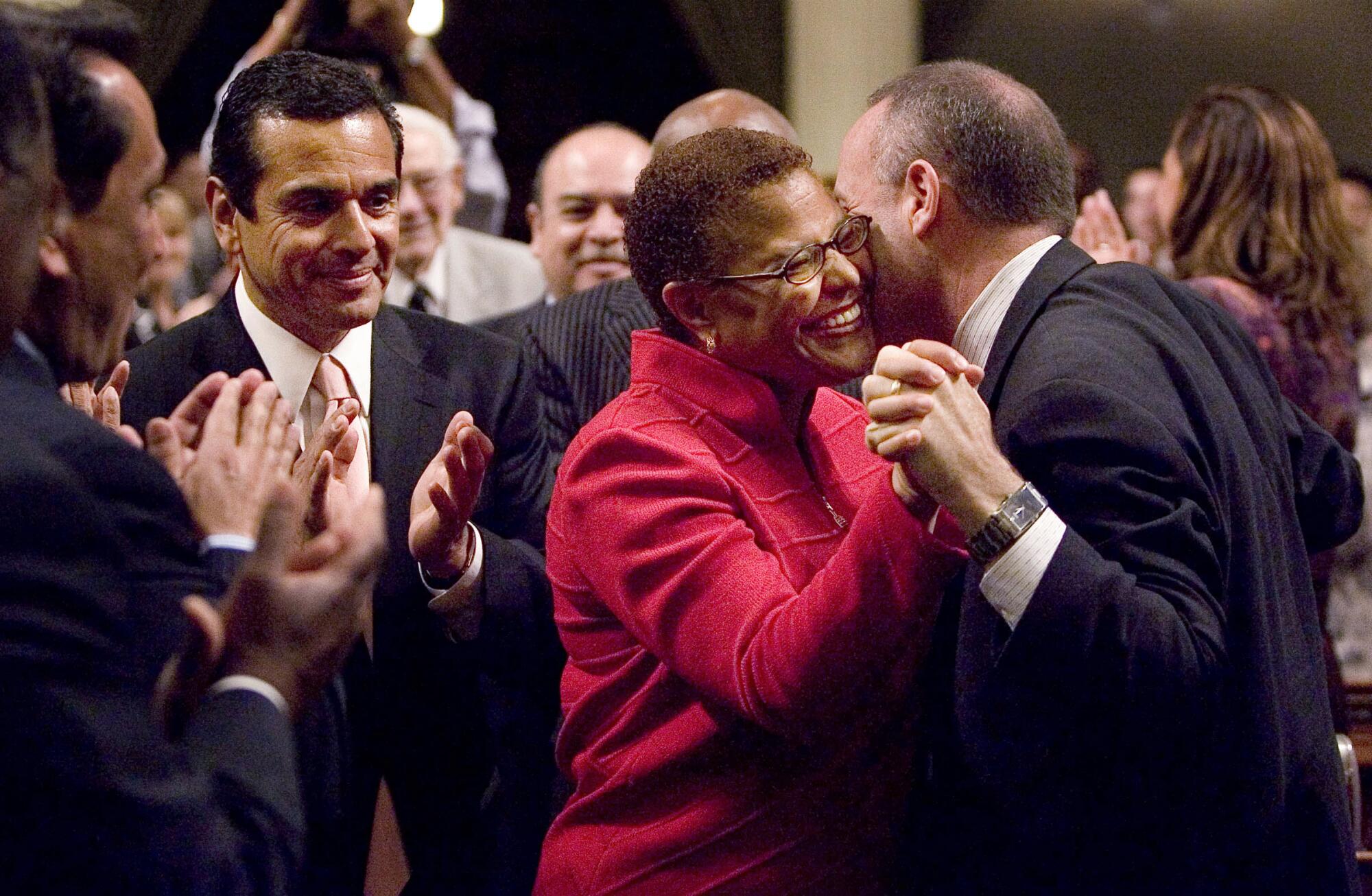
Bass’ firm leadership of Community Coalition propelled her to Sacramento as a state Assembly leader and eventually to the House of Representatives, culminating in then-presidential candidate Joe Biden considering her for his running mate in 2020.
How she came to start Community Coalition and turn it into a political force speaks to how she might run Los Angeles if she were elected mayor, and tackle the city’s most pressing crisis: homelessness.
Her evolution has been more about method than any shift of principle, which she began developing almost 60 years ago, listening to civil rights marches on the radio with her father, according to interviews with nearly 40 friends, family members and colleagues in Los Angeles, Sacramento and Washington.
As an adult she moved from being a leftist who frequently visited Cuba to a physician’s assistant seeing the needs of South L.A. up close to a crafty community leader rallying politicians to her cause to a political leader herself now pushing colleagues to follow a philosophy she’s long thought was paramount.
“I don’t think much has changed about her in terms of building coalitions but I think definitely over the years, she’s just become more practical, more realistic as far as what actually can be done,” her older brother Keith Bass said. “That has been a big, big, big change and moved her quite a bit in terms of away from being extreme left.”
Get the lowdown on L.A. politics
Sign up for our L.A. City Hall newsletter to get weekly insights, scoops and analysis.
You may occasionally receive promotional content from the Los Angeles Times.
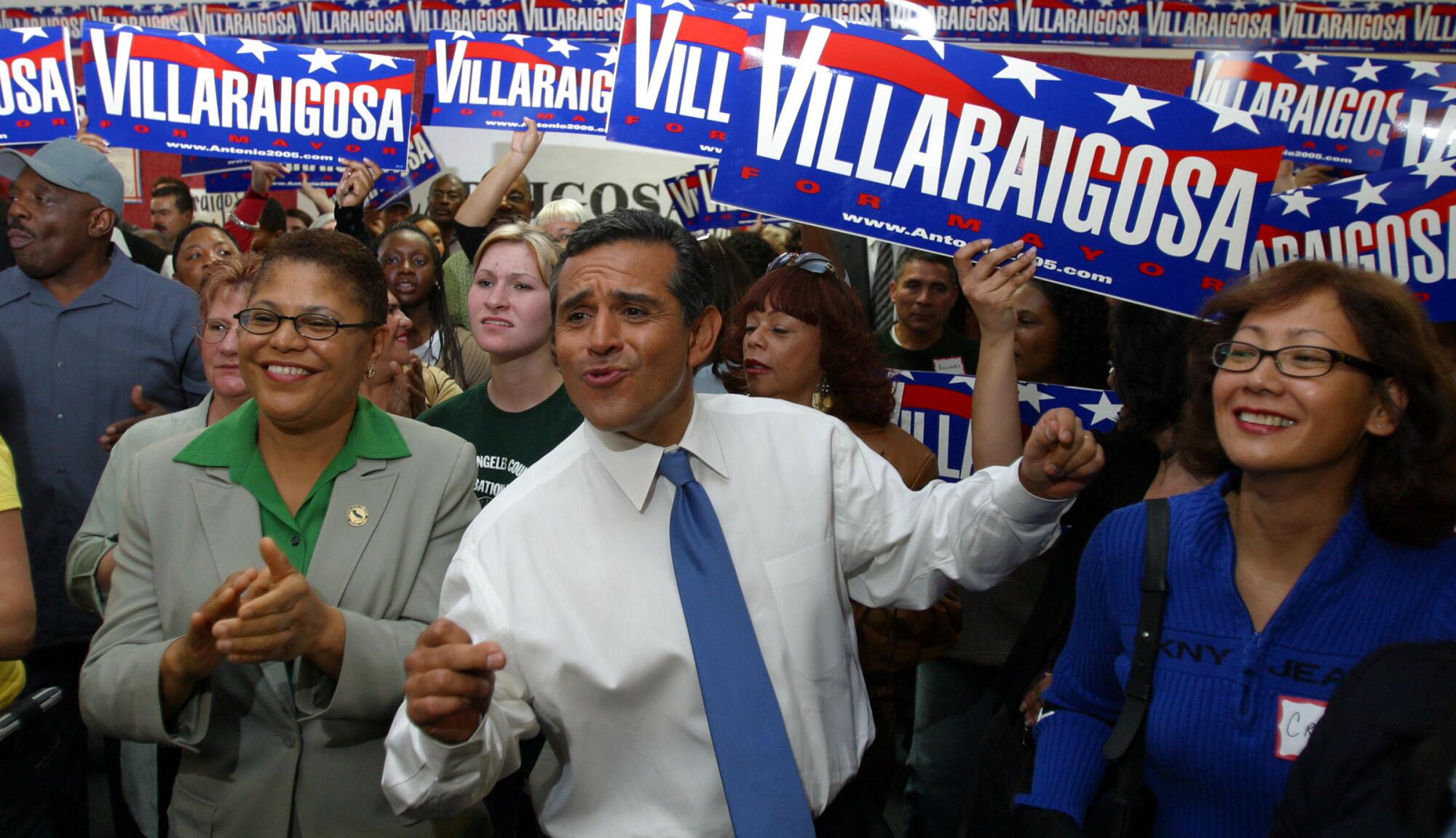
Bass came up with a generation of activists in different parts of the city in the ’80s and ’90s, some of whom became politicians: Mark Ridley-Thomas, Gil Cedillo, Maria Elena Durazo and Antonio Villaraigosa.
“We all moved toward pragmatism,” she told The Times over breakfast, two hard-scrambled eggs, turkey bacon and sourdough toast on a recent Friday morning at C.J.’s Cafe near her Baldwin Hills home.
“This is what I say to the younger people in Congress — do you want to make a point or do you want to make a difference?” she said.
She still counted on people on the outside pushing those in power toward accountability, but “when you make that conscious decision to go on the inside, you understand where you’re going and why. ”
Bass was born in South Central and raised in the Venice-Fairfax area of L.A. with three brothers. She came of age steeped in politics. Her mother, Wilhelmina, was a homemaker who also took care of other children — including those of parent-activist Rita Walters, who would later serve on the City Council. Her parents’ friends were union and civil rights activists.
Her father, DeWitt — a postal carrier — ignited her interest in current events by listening to the news with her each morning around 4:30, before he began his route, during the apex of the civil rights movement. Bass recalled that she was a “news junkie at a very early age.”
At 14, she stuffed envelopes and knocked on doors for the presidential campaign of Sen. Robert Kennedy. She registered as a precinct captain using her mother’s name and coordinated the door knocking in the area.
“Politics was all around me,” she said. “When Bobby Kennedy was killed. I was listening to it on the radio. We didn’t have TV. That was very traumatic.”
Ballots are already arriving in Los Angeles homes ahead of the June 7 primary. Karen Bass and Rick Caruso have led the mayoral pack, with nearly 40% of likely voters undecided.
At Alexander Hamilton High School she was one of the first Black girls elected a cheerleader.
A melting pot of bohemian Jews, Black students and a growing Latino population, the school was a hotbed of political thought. She participated in protests against racial injustice and the Vietnam War, walkouts in support of striking teachers.
Bass’ father was deeply concerned about her participation in these movements, even if he usually supported the cause. In the 1950s two FBI agents had knocked on their door, she said, because some friend of his had signed a petition. These were two of the first white men she said she remembers seeing in her neighborhood. As a federal employee, her father knew he could lose his livelihood and his family’s tentative foothold in the middle class if he was seen as subversive.
But Bass was charting her own course by the late 1960s. She got reprimanded by the cheerleading coach for not standing appropriately for the national anthem and for wearing armbands to protest the war.
“Some of us goofy girls were worried about silly things like, how can we get to the beach without our parents finding out about it, and Karen wasn’t interested in that kind of stuff,” said Susi Shapiro, a friend from high school. “She was interested in more serious things. The anti-Vietnam War protests were a big deal. There was always just some injustice that was happening out in the world.”
When high school ended in 1971, Richard M. Nixon was president and Bass, angered by the direction of the country, headed to San Diego State University where she fell in with a crew of antiwar activists, including professor Peter Bohmer.
She had gone to school with some interest in medicine, but quickly realized medical school wasn’t for her and was unsure what she wanted to do with her life. Bohmer remembers a self-possessed young person with a single-minded focus on fighting injustice who wanted to learn from other more radical activists on campus.
“She was always going out and using her really good organizing skills, which you could see from the very beginning.”
A starkly contrasting pair are on track for a November runoff that would feature sharp divides by ideology, geography and race.
Bass said the FBI surveilled her at her house, her work and the homes of her friends. Bohmer’s tires were slashed and tear gas canisters were placed in his car. At one point, a woman living in the same house as Bohmer — and a home Bass sometimes visited — was shot from a passing car by a white supremacist while an FBI agent who had infiltrated the cell was driving .
Eventually, the ongoing surveillance and threats in conservative San Diego proved too much for Bass.
She set out on a trip to Cuba in 1973, wanting to explore alternatives to capitalism and the American system, which displeased her parents.
“Their immediate reaction was, ‘if you do that you’re done with us,’ ” said Bass, who was undeterred.
Bass knew that Cuba had problems — and poverty — but wondered how it still managed to educate people and provide healthcare.
For two months, she built houses, then toured the country as a member and California organizer for the Venceremos Brigade, a group founded by young Americans to show solidarity with the Cuban revolution.
She took at least 14 more trips — including one with her mother — to Cuba before she joined Congress in 2011.
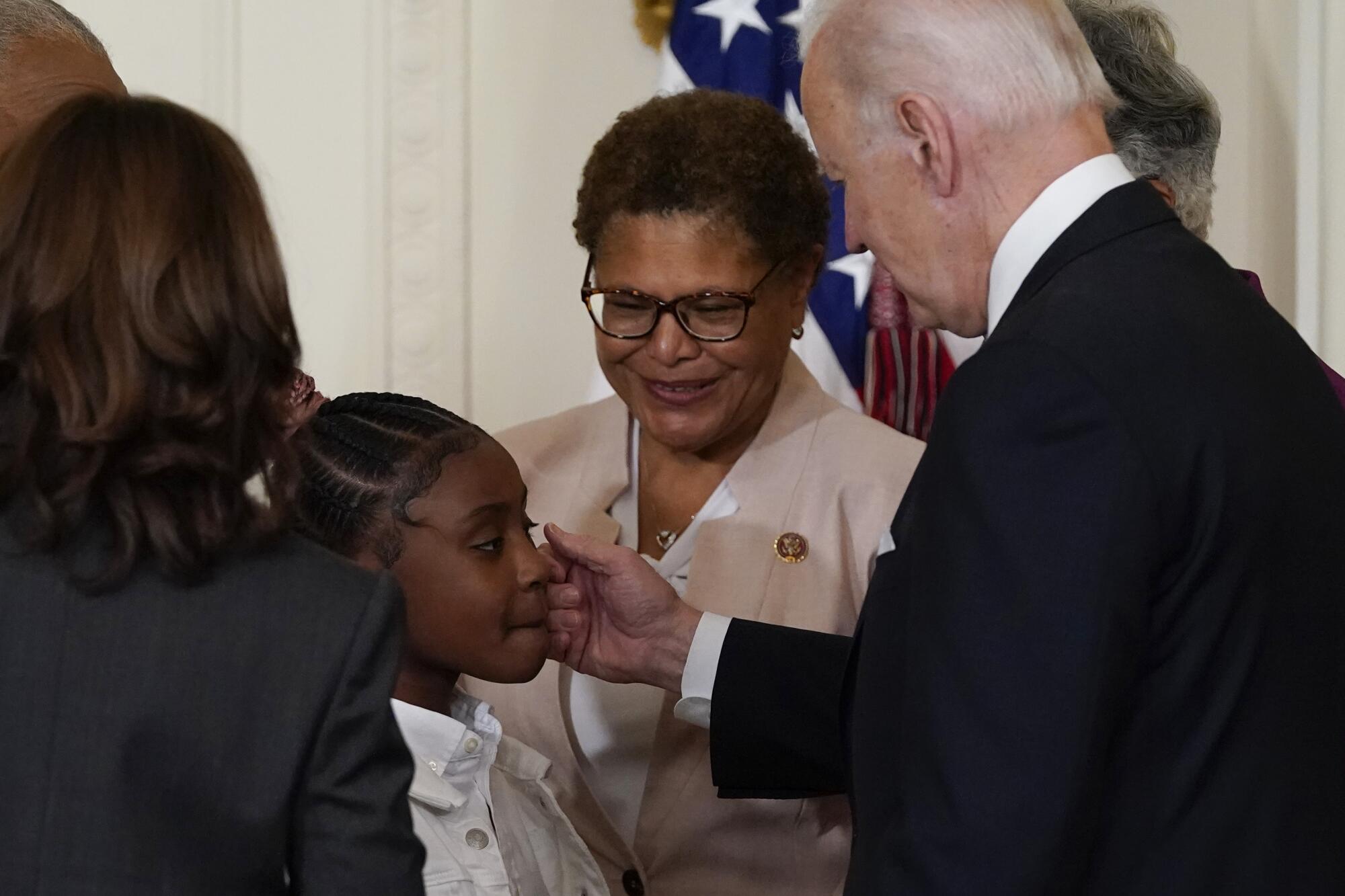
Bass catapulted to Biden’s short list thanks to her pragmatism and unassuming style, which have impressed progressives, moderates, even Republicans.
These trips would resurface when she was being considered as Biden’s running mate in 2020, and Bass was criticized for making sympathetic comments upon the death of Fidel Castro. That and complimentary remarks she made before a Church of Scientology meeting in 2010 hurt her chances of joining Biden on his ticket.
When she returned to California after her first trip to Cuba, she didn’t go back to San Diego and instead began training to become a nurse in L.A. She needed to make a living while her political activism grew in ambition. Throughout the 1980s, Bass worked on the anti-apartheid movement protesting the injustices in South Africa along with police misconduct in Los Angeles.
After graduating from Cal State-Dominguez Hills, she entered the physicians assistant program at USC.
Driving through skid row every day to get to County hospital and seeing who came into the emergency room and why shaped her view of how the lack of healthcare, jobs, housing and quality education crippled communities and left a void for addiction to fill.
In 1989 she attended an academic conference in San Francisco titled “Death of a Race,” which drew hundreds of people from around the country to discuss the devastation crack was causing. She recalls a collective sense from everyone of “not knowing what to do.”
She wondered if the crack cocaine flowing into South L.A. was going to do what smallpox did to Indigenous people.
“If one sincerely wants to understand what has happened, one must examine the economic deterioration of the black community,” Bass, “medical professional and African-American resident of Los Angeles,” wrote in a letter to The Times decrying two 1989 stories about the drug epidemic and calling for “the public health issues created by crack cocaine be addressed.”
In winter 1990, she organized an event at USC similar to the San Francisco conference, where participants resolved that they needed an organization that could fight for structural change around the inequities feeding the cocaine epidemic.
After that, Community Coalition was born.
Rep. Karen Bass is facing criticism from the left over her positions on homelessness and crime, with prominent activists putting her on notice.
“The original goal was to get rid of [LAPD Chief] Daryl Gates and stop what he was doing, which was Operation Hammer,” she said — referring to the effort to root out street gangs in South LA that resulted in the arrests of thousands of Black men and women.
Gates had been a bete noir to her for a long time. Earlier, Bass had been part of a band of activists who — with the American Civil Liberties Union — sued Gates and the LAPD for spying on them. In retaliation he released information about her trips to Cuba, falsely asserting she had gone to learn guerrilla warfare.
With crack cocaine Gates saw only criminality, where Bass saw a health crisis. She lobbied for more drug treatment and also took aim at liquor stores, which many saw as having a terrible effect on the health of her community.
In her view, all the inequities she had been railing against exploded on April 29, 1992, after a jury acquitted four LAPD officers in the beating of Rodney King.
Bass was driving down Florence Avenue heading for First African Methodist Episcopal Church when the protests spun into something far more violent. Her car was nearly hit by a brick and she was heartbroken to see the destruction over the next three days spreading through South L.A. and beyond.
For the record:
6:31 p.m. May 29, 2022An earlier version of this article referred to First African Methodist Episcopal Church as First AME Baptist Church.
She also knew the mission of her nascent organization would now change to be about rebuilding something better. These liquor stores had been havens of drug dealing and violence, and she felt they were dangerous and hurt neighborhoods.
“When the liquor stores all burned down and the community demand was for them not to come back, I knew I was going to have to rise to the occasion, and lead this movement,” she said.
She wanted to replace the liquor stores with grocery stores and supermarkets to bring more fresh food into an area where the most affordable meals were fast food from the likes of McDonald’s, Taco Bell and 7-Eleven.
Read our full coverage of the 30th anniversary of the L.A. riots.
This became a political calling that frequently brought her before the City Council. She helped collect nearly 35,000 signatures calling for a moratorium on liquor stores. Her efforts resulted in more than 150 being closed or prevented from rebuilding.
She had told the New York Times after the riots that “like a miracle, a large chunk of the [liquor] stores we wanted to close were burned to the ground.”
This aspect of Community Coalition’s work still inspires angry feelings for some people in the city’s Korean community, who owned many of those stores.
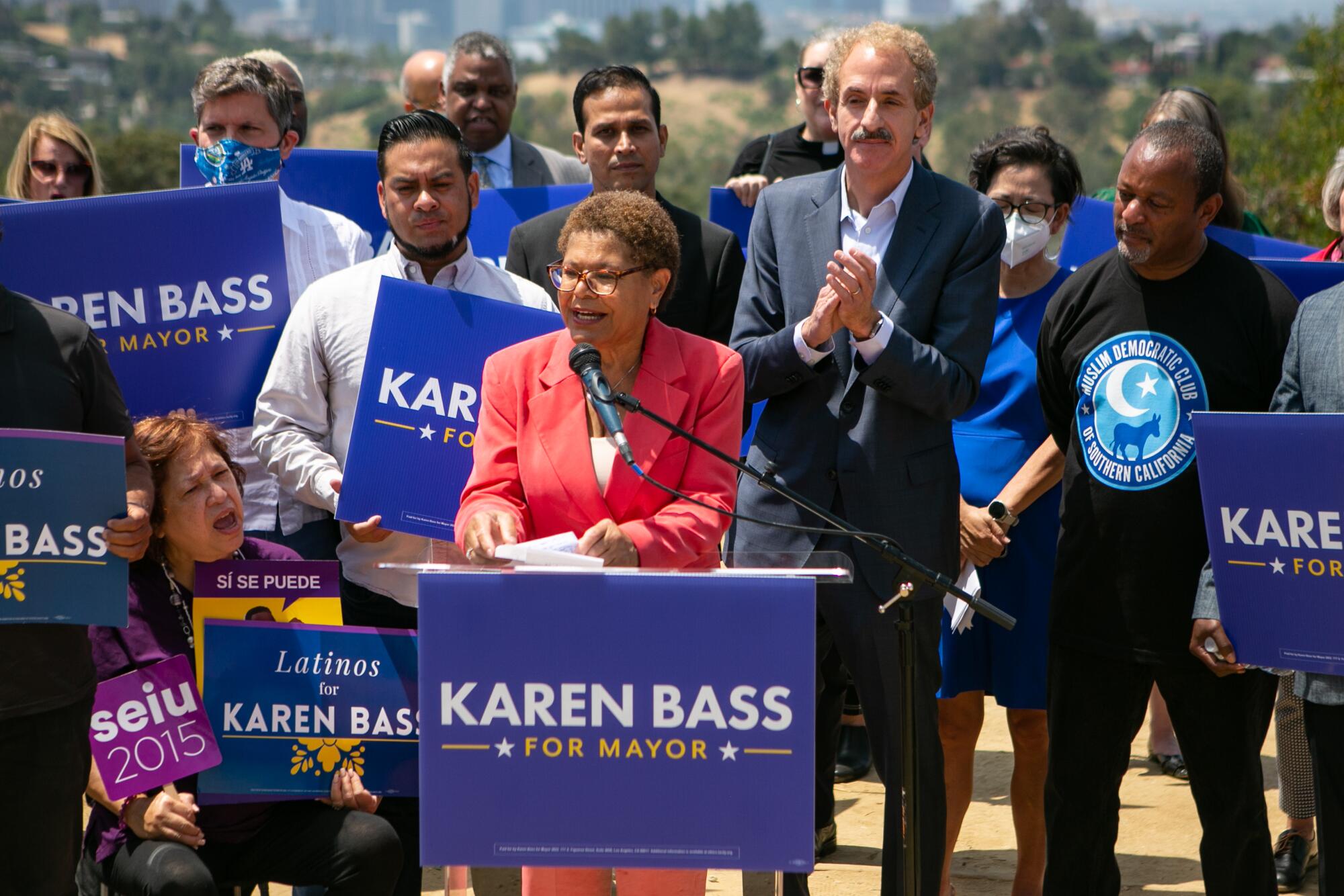
Now running for mayor, she has been trying to make amends. In a February meeting with a group representing Korean American liquor store owners, she apologized, saying her words were taken out of context, but added: “I understood how my comments could have been hurtful.”
Over time, the goals of Community Coalition broadened to pushing local and state government to invest more in South L.A. — in after-school programs, gang intervention, education advocacy and foster care reform. It also became a training ground for a wave of young activists, including Marqueece Harris-Dawson, who headed the group after Bass and is now a Los Angeles councilman.
In the early 2000s, Bass watched as two of her allies on the council — Ridley-Thomas and Walters— prepared to leave. She worried that some of the gains that had been made might be imperiled, and considered running for council.
But when Bernard Parks entered the race in her district — after being pushed out as police chief — she decided not to run against him.
At that time, she was also taking care of her father, who was sick with cancer and dying. She had married and divorced and was helping raise her daughter, Emilia, and four children from her husband’s second marriage who still call her mom.
At a campaign event, one of them, Yvette Lechuga, invoked that beat up green minivan, saying: “She took me to my doctor’s appointments and loaded up the van with me and my sister Emilia and all my other brothers and sisters, and go head to the beach, go to the museums and just run around LA.”
California’s 2022 primary election is Tuesday. Here’s how to cast a ballot.
In 2003, at the urging of labor leader Miguel Contreras and Rep. Diane Watson, she ran for the state Assembly. She won and quickly ascended the leadership ladder into posts helping run the caucus and coordinate votes. As a legislator she continued to work on subjects including education and foster care, which she became an authority on.
In October 2006, Bass’ daughter Emilia, 23, was riding on the 405 Freeway with her husband, Michael Wright, at about 4 a.m. She was slated to graduate from Loyola Marymount in a month. Wright veered off the road and the 1997 Hyundai crashed into a support beam and burst into flames. Both Emilia and Michael were killed.
Bass bottled up her devastating grief. She was about to be sworn in as majority leader. Her family had celebratory events planned in Sacramento. All her children , including Emilia, were going to come along with her brothers and friends.
Her friends and colleagues said that Bass trudged, rarely showing her grief. She says now that she needed to “learn how to emotionally compartmentalize to survive.”
A few days after Emilia’s death, Bass had to go to Sacramento to nominate Fabian Nunez for Assembly speaker. He had told her that it wasn’t necessary but she insisted on being there.
“I went and I nominated him and then a few hours later, when I’m at home, I completely collapsed. I fell apart,” she said. “But I had to keep it together. I felt like, that’s what she would want and expect me to do.”
After serving as majority leader, Bass replaced Nunez as Assembly speaker, becoming the first Black woman to hold this position.
She had been eager to use this role to expand the sorts of programs she advocated for as the head of Community Coalition. Soon, however, the economy tanked — and the job changed. She was now part of the big five — the Republican and Democratic leaders in each chamber, along with the governor — trying to figure out how to close a $42-billion budget shortfall.
The topic has been the subject of fervent speculation in recent weeks.
Bass told her colleagues these meetings were like “going to Gitmo.”
“I just felt like it was a torture session,” Bass said. “And the torture session was knowing that I had to make cuts to these programs. I mean, I had to cut dental care.”
Bass and state Senate President Pro Tem Darrell Steinberg battled with Republicans over the cuts and insisted they needed to raise taxes in exchange. Republican Assemblyman Mike Villines, who was the note-keeper during these sessions, likened Bass to the teacher of the group.
When other members strayed from the subject at hand or reopened a debate that was already resolved, she would peer over the top of her glasses and sternly point to Villines’ notes.
“She was very funny about it when she rolled her eyes,” Villines recalled. “You’ve been caught. You weren’t gonna go back. You couldn’t change your word. But mostly what I remember was she was very patient. I always remember we were going to work through it.”
The deal they agreed to prevented nearly 20,000 state workers from getting fired. Democrats had to swallow huge cuts to social service programs — including education and prison healthcare — but were able to extract increases to the sales and income taxes from Republicans.
Villines, who called Bass “pragmatic,” said this sort of compromise wouldn’t have happened without her. The flak she took from her own members offered a measure of credibility when dealing with Republicans. The legislators ended up winning the JFK Profile of Courage award for this compromise.
These tax increases and ones that came when Proposition 30 passed under Gov. Jerry Brown in 2012 have helped put the state on firmer financial footing.
“Let’s just solve problems,” Villines said of her mentality . “Let’s just do things, and that’s what I liked about her.”
Now Bass is running neck-and-neck against the hotel-and-mall tycoon Rick Caruso, who altered her early political course when he was head of the police commission and helped push Parks out as police chief. While the billionaire and the activist-turned-politician could hardly be more different, they’ve had a warm rapport over the years.
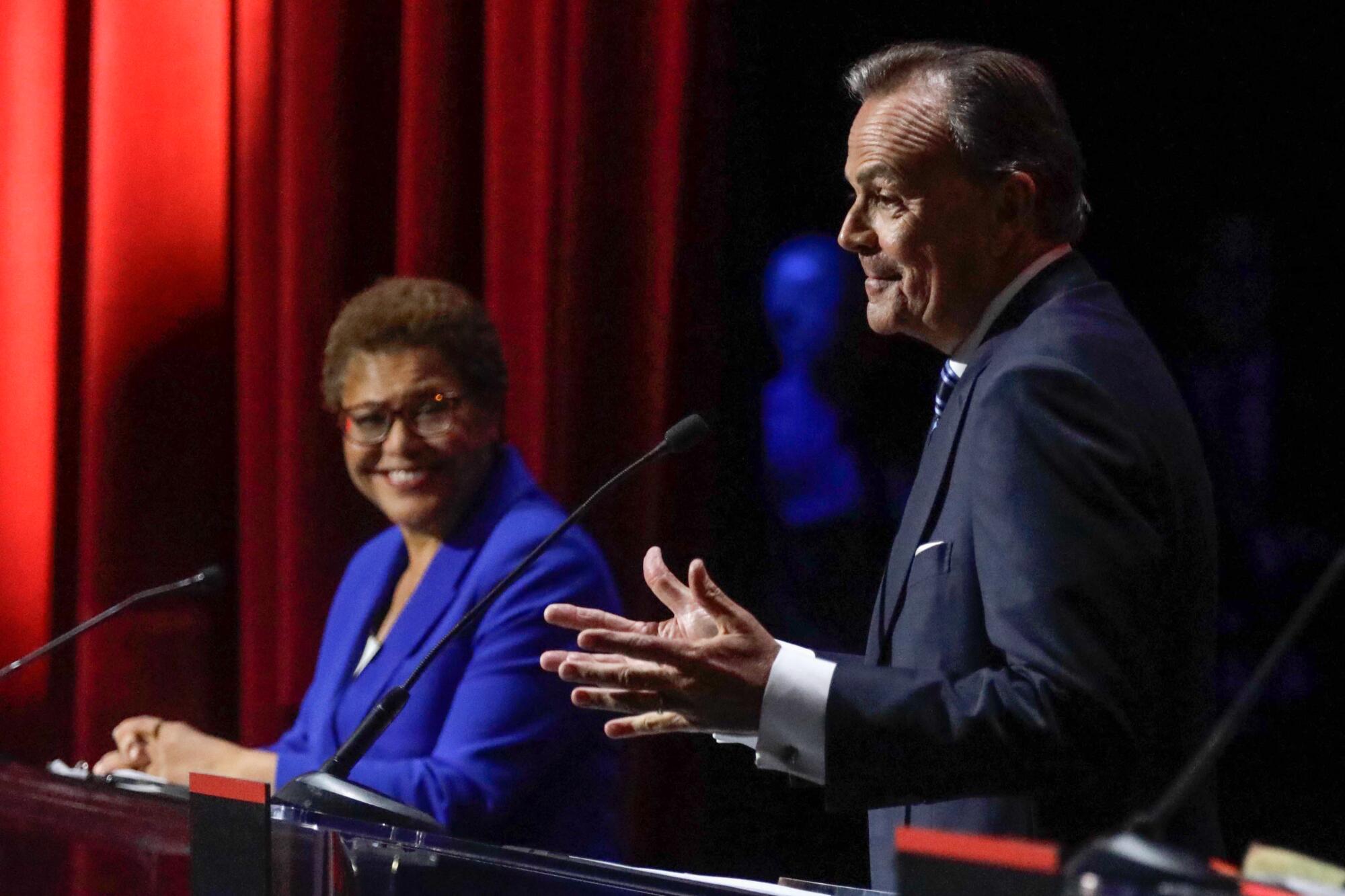
In Congress, Bass was the architect of the George Floyd Justice in Policing Act, and tapped Caruso to help lobby centrist members of the House. (The bill did not pass.)
But the ways they say they plan to approach the city’s myriad problems are as stark a contrast as their backgrounds.
Rep. Karen Bass, a leading candidate for L.A. mayor, released a public safety plan calling for 250 officers to move off desk duty and back onto patrols.
Caruso harshly criticizes elected officials for their failure to get a handle on the homelessness crisis, inveighing against councilmembers for not doing enough to address this crisis amid a cesspool of corruption. The message has resonated in many circles — in a city angry over tents on its streets, crime on the rise, filthy buses and trains.
Bass trumpets her relationships with elected officials at the local, state and federal levels, saying her ability to build a coalition is the only way to propel the city forward and fix its ills.
Since entering the race, her ties to USC — dating back to her time as a physician assistant — have also led to some bumps in the road.
Groups supporting Caruso have criticized her for taking a $95,000 scholarship from USC to pursue a graduate degree in social work, while she was in Congress. While Bass was never accused of any wrongdoing, they have sought to tie her to a federal corruption case targeting the USC dean who gave Bass the scholarship and Ridley-Thomas, an ally who is also a defendant in the case.
She has not been mentioned in the case.
Meanwhile, Bass has taken flak from the left for calling “defund the police” “probably one of the worst slogans ever.” She does not want to cut the police budget and says there needs to be enforcement that keeps streets clear of tents, while building more beds for people in crisis. This inspired an activist— Gina Viola, who wants to defund and abolish the LAPD — to run against her.
It also angered people in the community she’s known for years.
“What we need right now is a Mayoral candidate with vision, one that can liberate us from the woes of a houseless crisis, gentrification, and an LAPD that is the most murderous police department in the country,” wrote Melina Abdullah and Patrisse Cullors, two longtime leaders in the Black Lives Matter movement, in an essay published by the LA Progressive weeks after the release of Bass’ public safety plan.
“Right now, Congresswoman Karen Bass is not that candidate.”
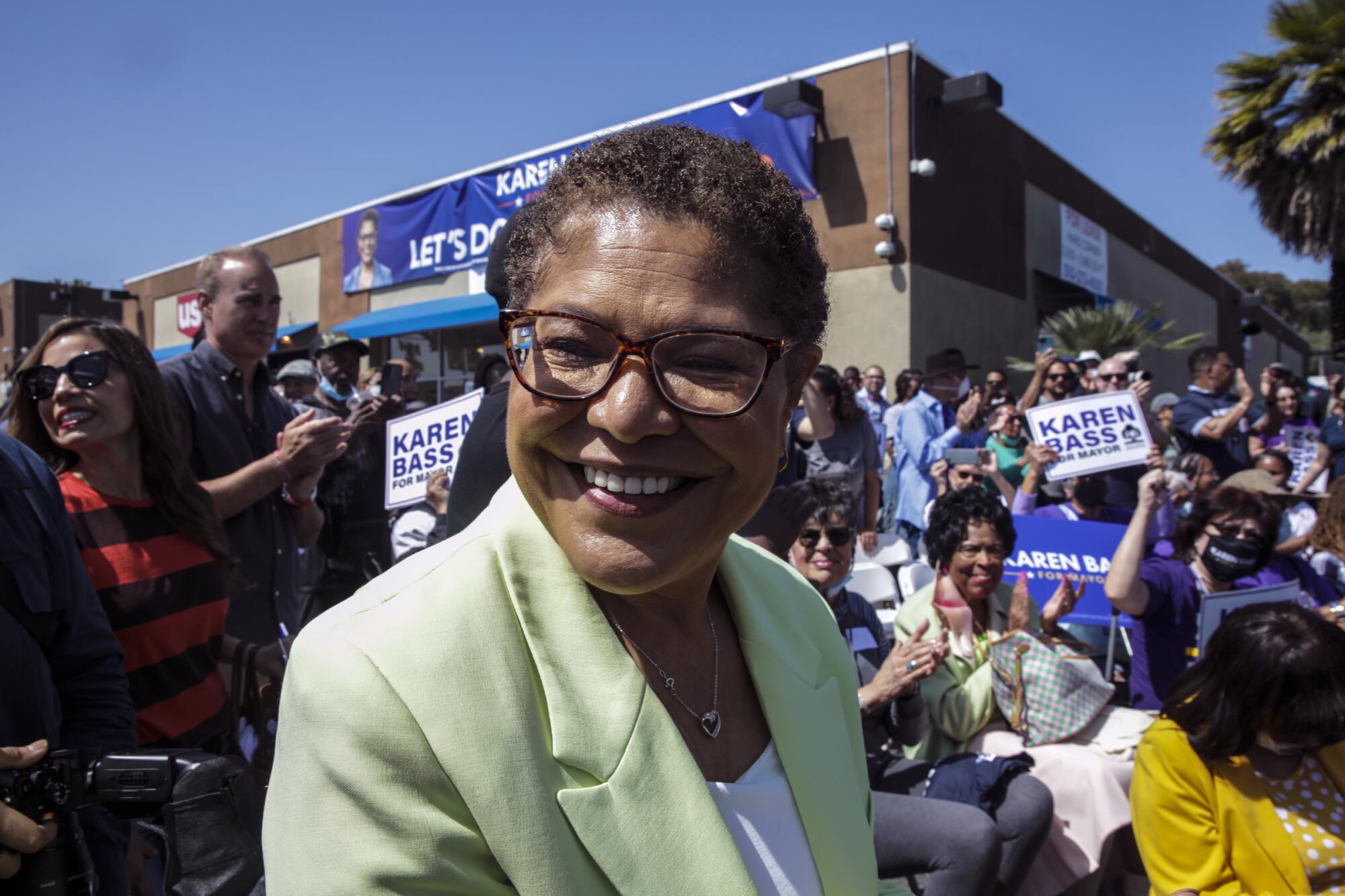
Bass said she remains focused on the crises the city is facing — homelessness, housing affordability and inequity in healthcare, schools, jobs. The campaign brings her back to what she saw in the emergency rooms and what she fought for with Community Coalition: “I feel like I’m coming full circle. I feel like I’m right back in 1990, which is why I keep referring to it.”
More to Read
Sign up for Essential California
The most important California stories and recommendations in your inbox every morning.
You may occasionally receive promotional content from the Los Angeles Times.


